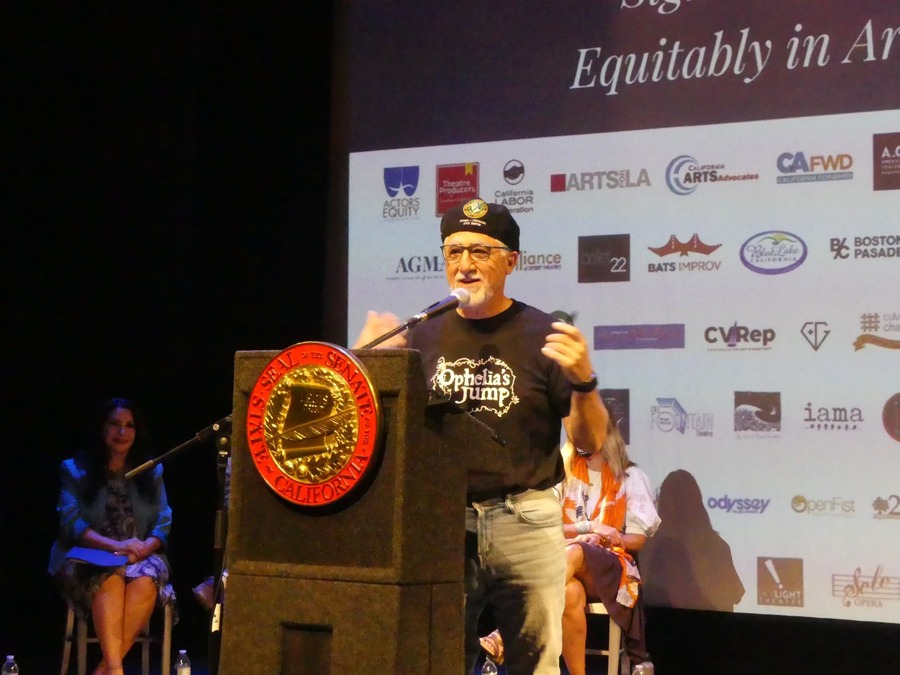As actual forest fires rage in California, there’s been a metaphorical blaze sweeping across the states arts communities, for reasons to be explained below, and State Senate Bill 1116 is the second attempt in two years to send in a fire brigade to save some buildings where people make art and attract audiences who, consequentially, contribute to local and regional economies. The prior attempt, Senate Bill 805, made it through the State Assembly and Senate only to be vetoed by Gov. Gavin Newsom.
This year’s effort, Senate Bill 1116, is authored by Sen. Anthony Portantino (D, 25th District), co-authored by Assembly Member Ash Kalra (D, 27th District), along with four other co-authors. The bill was endorsed by organized labor when it was first introduced in the State Senate on Feb. 16. More significantly, it was endorsed at the starting gate by the national stage actors’ union, Actors’ Equity Association (AEA). In the intervening months, it has been approved by the California Senate and Assembly—the latter on Aug. 29, sending it to the Governor, on whom everybody’s hopes are pinned once again.
Why is such a bill necessary?
Small nonprofit arts organizations have suffered from the unintended double whammy of a pandemic and a state law (Assembly Bill 5) that took effect in January 2020, which required that all workers in most businesses in the state (including large and intimate theatres) be reclassified as employees rather than independent contractors. AB5, with its minimum wage requirements for rehearsals and performances, plus payroll tax costs, workers’ comp costs, unemployment insurance costs, COVID testing costs, etc., has spiked the production cost of a single play in a studio theatre of 99 seats or less, operating on an annual budget around $150,000 (as most in L.A. do), from $20,000 to over $80,000, depending on the size of the cast and the length of the run, according to several producers in Los Angeles. Add to that California’s historically anemic support for the performing arts, at 28 cents per capita (24th highest in the U.S. in 2021, even after the California Arts Council’s recent infusions of funding), contrasted against the nation’s leader, Minnesota, at $6.37 per head.
Anecdotal evidence gathered by the L.A. theatre review and discussion website stageraw.com (of which I am the founder and publisher) shows a significant drop in small theatre productions since 2020. Specifically, in 2019, the ratio of shows in theatres in theatres with 99 seats or fewer averaged 80 percent of all stage content across the region, contrasted against the mid-size and larger venues, which have been less affected by AB5, though they have still felt the impact of attendance challenges brought on by COVID. Currently the ratio of small theatre productions is now down in the range of 50 to 20 percent of all shows in the region.
Needless to say, the impact of the newly enacted labor costs on organizations with smaller budgets (often operating in already underserved neighborhoods) is more severe than on organizations with higher annual budgets and standing union contracts. SB1116 is designed to redress these fiscal and regional inequities.

SB1116 (a.k.a. The Performing Arts Equitable Payroll Fund) would require the state Office of the Small Business Advocate to establish and administer a grant program, funded by a Performing Arts Equitable Payroll Fund. The ask is for $300 million over three years, for which small arts organizations may apply for reimbursement costs to ensure compliance with AB5. In anticipation of the bill’s passage, there are current requests for proposal (RFPs) for a “paymaster” to disseminate the funds and ensure administrative and financial compliance with federal and state tax laws.
An avid supporter of the bill, Actors’ Equity Association president Kate Shindle told me she has no idea what Gov. Newsom will do, noting that “with the stroke of a pen,” he could rescue an entire sector while fueling local economies.
“The answer to the questions that were raised around 2015 and [L.A.’s] 99-seat theatres was not that actors don’t want to be paid; it was not that theatres didn’t want to pay them—it was just that there wasn’t enough money,” Shindle said. “Producing theatre is just not that easy. The desperate ways these theatres were trying to raise money, it doesn’t help anybody.” The important question going forward, she said, is how to reach Equity’s goal—i.e., to pay theatre workers wages with benefits—without “ruining smaller theatres.” She added, “And nobody anticipated COVID.”
Expressing his appreciation to Sen. Portantino and his staff, AEA’s national director of public policy Brandon Lorenz said that the bill promises to “make California a leader in arts funding, so that artists are not forced to shoulder the burdens of under-investment in the arts, and asked to work in a theatre where there’s no workers’ comp protections or unemployment insurance for them. This bill is really innovative, because it’s the only bill that can draw a direct line between arts funding and compensation of workers.”
But, you may ask, isn’t this a kind of socialism—asking taxpayers to subsidize workers’ pay in businesses that can’t pull their weight in the free market?
“The view that this is charity and not an investment is ridiculous,” fired back Martha Demson, artistic director of Open Fist Theatre in Los Angeles, and president of the Theatre Producers of Southern California. “Tax credits for the film industry—who calls that communism? What’s lovely about this is that this stabilizes the system by helping support the jobs.” Demson said that a third of the investment will come back to the state in taxes once these organizations reach sustainability. And with the job growth incentivized by that sustainability, “It will take maybe seven, eight years on average for the full investment to be paid back, and then you’ve just built up your sector.”
Meanwhile, supplementing Demson’s win-win argument, Lorenz noted that each arts patron contributes an added $31 to local businesses via local bars, child-care, parking, etc.
So why would the Governor sign this bill, after last year vetoing last SB805, which aimed to do much the same thing?
Among other reasons, “timing,” said the bill’s author, Sen. Anthony Portantino, who reasons that people now fully understand the challenges of AB5 and the negative impact the pandemic had on the performing arts. He noted positively “the number of colleagues who came up to me and said this is really important. People get it, and I’m optimistic that the Governor is going to sign it.”
One potential glitch: As of now, the $300 million, three-year program has zero funds attached. When it was first proposed, there was $100 million attached, before those funds mysteriously vanished.
“Truthfully, I was not happy,” Portantino said. “It was everybody saying it was somebody else’s fault. At this point, I don’t care who made this decision, I just want to make this law, and then make sure it’s funded.”
In terms of realpolitik, though, Portantino sees this shortfall as a potential plus: Because this funding is now subject to the broader budget appropriation, Portantino believes that any pretext for the Governor not to sign it has been removed. “Those [budget] decisions can be tweaked, emended…so I think that’s a strength in our approach right now.”
After expressing his appreciation to artists “up and down the State,” Portantino said he won’t rest until this bill becomes law, and is fully funded. “We’re not going to let the camera or the lights go dim until we get this through.”
Newsom’s decision could come at any time.
Steven Leigh Morris (he/him) is a playwright, journalist, and novelist. He currently serves as director of the play development program PLAY LA and hosts “Animal Farm,” a weekly talk show about theatre and politics.


